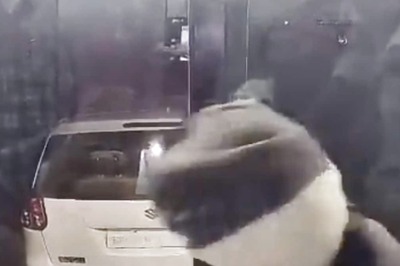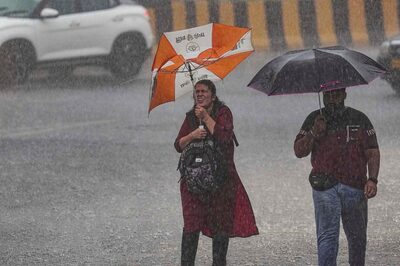
views
Kathmandu: The first rescue plane carrying people injured in an earthquake-triggered avalanche that ripped through tents on Mount Everest arrived in Kathmandu on Sunday shortly before a strong aftershock rocked India and Nepal and triggered more snowfalls.
Nepal's worst earthquake in 81 years, at 7.9 magnitude, killed at least 2,000 people on Saturday.
Survivors on Everest described a cloud of rock and ice that smashed into base camp, and many climbers were still on the mountain when an aftershock triggered a new series of avalanches on Sunday. There were no immediate reports of more casualties.
"Another big one. Really big. Rockfall off surrounding peaks in North Side #everest base camp. Worst possible news for south," climber Adrian Ballinger posted on Twitter.
The 6.7 magnitude aftershock felt as far away as Delhi also set off an avalanche on nearby Mount Makalu, the world's firth highest peak.
"Another one, we have an aftershock right now. Oh shit," said Indian climber Arjun Vajpai, talking by phone from Makalu base camp. "Avalanche," he shouted.
Shouts and the roar of crashing snow could be heard as he spoke. Vajpai said he survived the latest avalanche but that it was closer to camp than earlier snowfalls.
The survivors flown down from Everest included three from China, Japan, and South Korea. Several of the injured had bandages on their heads, one spotted with blood and all were able to walk.
Tourism ministry officials estimated that at least 1,000 climbers, including about 400 foreigners, had been at base camp or on the ascent to the peak when the earthquake struck.
The Saturday avalanche buried part of base camp and swept away tents as climbers gathered near the main route to the summit at the beginning of the climbing season in the deadliest incident on the mountain.
"Tents have been blown away," said Gelu Sherpa, who was at the camp when disaster struck. "There is a lot of confusion on the mountain and the toll will rise."
At Everest camps 1 and 2, above base camp, 100 climbers and guides were unable to descend because of damage to a route through the treacherous Khumbu icefalls, a rescue leader said.
Helicopters rescued seriously injured climbers in the morning and later brought down a few climbers from Camp 1 on Sunday, Romanian climber Alex Gavan, who was at base camp, posted on his Twitter account.
"All badly injured heli evacuated," Gavan said. "Caring for those needing. want sleep."
In another tweet, Gavan said that climber Willie Benegas had be helicoptered up to camp 1 to bring ropes, ice screws and snow pickets to climbers trapped there.
US climber John Reiter said dozens of people had suffered critical injuries, many of them with head injuries. "It's been a rough 18 hours," he told CNN.
One of those killed was Dan Fredinburg, a Google engineer based in California. He suffered head injuries when the avalanche hit, according to a statement from the mountaineering company that had taken him to base camp. Steve Moffat, a mountain guide and operations coordinator for New Zealand-based Adventure Consultants, said two Nepali staff had been killed.
US based Madison Mountaineering said its base camp doctor, Marisa Eve Girawong, died in the aftermath of the avalanche. April is one of the most popular times to scale the 8,850-metre (29,035 foot) peak before rain and clouds cloak it at the end of May. Almost exactly a year ago, an avalanche killed 16 Nepali guides in what had been the single deadliest day on the mountain.
Saturday's quake was the strongest to hit Nepal since 1934. It also shook neighbouring India, China and Bangladesh.




















Comments
0 comment